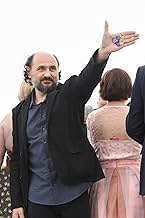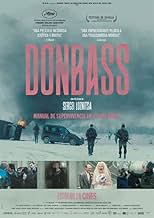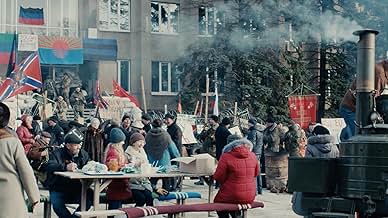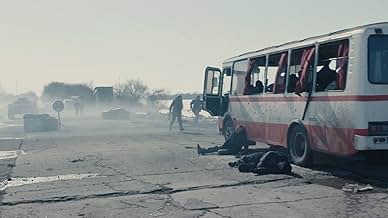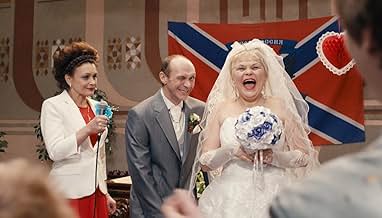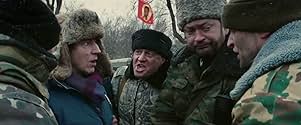Donbass
- 2018
- 2h 2m
ÉVALUATION IMDb
6,6/10
5,1 k
MA NOTE
Dans l'est de l'Ukraine, la société commence à se détériorer à mesure que les effets de la propagande et de la manipulation font surface dans cette époque post-vérité.Dans l'est de l'Ukraine, la société commence à se détériorer à mesure que les effets de la propagande et de la manipulation font surface dans cette époque post-vérité.Dans l'est de l'Ukraine, la société commence à se détériorer à mesure que les effets de la propagande et de la manipulation font surface dans cette époque post-vérité.
- Prix
- 9 victoires et 14 nominations au total
Olesya Zhurakivska
- Girl with bucket
- (as Olesya Zhurakovskaya)
Avis en vedette
It's a true glimpse into how modern war is being waged on Ukrainian soil. These are prime examples of how media and false news are being used to spread propaganda. What's not new is what war truly does to people. How it changes them. How humans desperately try to adapt to a desperate situation.
The movie is very accurate and chosen to show only one side of the Donbass are on purpose (you can't squeeze all into one movie). It SHOULD raise questions about "how come I've never heard of this.?" in your mind. Maybe media in the west has deliberately chosen to neglect this particular issue. Why?
All western countries bordering to Russia, however, follow events in Ukraine- and can varify the autenticity of this movie.
To Ukranians- make sure you have a friend next to you to have a drink with afterwards.. you'll likely need it.
The political events of recent weeks have brought to the attention of the whole world a geographical area whose existence most of us ignored or had very vague notions about - eastern Ukraine with the separatist regions that have proclaimed themselves recently independent republics. Those who want to know details about this conflict, which already has a violent history of eight years, can watch 'Donbass', the 2018 film by Ukrainian director Sergey Loznitsa, filmed by Oleg Mutu. I mention from the beginning the name of the cinematography director, the one who created the visual atmosphere of some of the best films of Cristian Mungiu and Cristi Puiu, because already after a few minutes of viewing I made the association with 'Memories from the Golden Age' of Mungiu . The confirmation that I had not made a mistake eventually came with the credits. But the stakes here are much higher, because unlike the Romanian director who casts an angry and sarcastic look at a recent but still past history, Sergey Loznitsa was dealing with a current tragedy in 'Donbass', and maybe, premonitory, with the future of a conflict that these days threatens to blow up the peace of Europe and the world.
Making a film about a violent conflict while this happens is no easy task. One of the most difficult obstacles is to prevent the film from becoming primarily a propaganda vehicle for one side or the other, and I will put aside the question of the historical or contemporary rightfulness of the causes of the conflicting parties. From start, Sergey Loznitsa leaves no doubt as to the side of the conflict in which he finds himself, using the official Ukrainian names of the regions in which the action takes place. There is a symmetry in the sequences that open and close the film, which have as characters a film propaganda team whose mission is to stage attacks with alleged victims on the separatists side. Death, however, is always present. The victims are real and the participants in the staging are not spared either. The constant coexistence with danger, bombings and explosions, degradation of life conditions and war damage are unknown to most people in Europe. 'Dombass' brings them to our attention and reminds us that this is a region of the continent, even if on its periphery today. In hindsight, the exposition seems prophetic, perhaps not to those who pay attention to the lessons of history, but Loznitsa's attention is directed to the people, to yesterday's neighbors now separated by history, propaganda, conflicts fueled by fake news, corruption and violence.
The filming style is a mix of pseudo-documentary with absurd comedy, and the boundaries are not always clear. As in a news diary or as in life, there is no clear line of action, some characters return, but each of the ten or so episodes could be a stand-alone report or short film. Some of them are pseudo-documentaries, inspired by real events and situations but filmed in the style of news sequences, with hand-held camera, long takes, live sound caption. A few other episodes are working, at least roughly, according to some script, but it is clear that the actors have been allowed to improvise and live their roles. The vision of the degradation of human relations in times of conflict is pessimistic and desolate. The absurd seems to dominate scenes such as the wedding or the one in which a businessman who came to recover his stolen car is blackmailed to donate it 'for the anti-fascist fight', to find out that he is just one of many in the same situation. The inspiration of Kusturica's and Mungiu's films is obvious. Other scenes have a more tragic tone - that of the bus with refugees returning to the separatist areas or that of the Ukrainian prisoner in danger of being lynched by the crowd intoxicated by propaganda. In both kinds of sequences, the distance between what we see on the screen and reality fades. The cold, the fog, the fear, the violence, the absurdity experienced by the people on screen envelop us. Now, four years after filming, it's the end of winter in Ukraine again. What we saw in 'Dombass' we see in the news and seems to become a reality that envelops us all.
Making a film about a violent conflict while this happens is no easy task. One of the most difficult obstacles is to prevent the film from becoming primarily a propaganda vehicle for one side or the other, and I will put aside the question of the historical or contemporary rightfulness of the causes of the conflicting parties. From start, Sergey Loznitsa leaves no doubt as to the side of the conflict in which he finds himself, using the official Ukrainian names of the regions in which the action takes place. There is a symmetry in the sequences that open and close the film, which have as characters a film propaganda team whose mission is to stage attacks with alleged victims on the separatists side. Death, however, is always present. The victims are real and the participants in the staging are not spared either. The constant coexistence with danger, bombings and explosions, degradation of life conditions and war damage are unknown to most people in Europe. 'Dombass' brings them to our attention and reminds us that this is a region of the continent, even if on its periphery today. In hindsight, the exposition seems prophetic, perhaps not to those who pay attention to the lessons of history, but Loznitsa's attention is directed to the people, to yesterday's neighbors now separated by history, propaganda, conflicts fueled by fake news, corruption and violence.
The filming style is a mix of pseudo-documentary with absurd comedy, and the boundaries are not always clear. As in a news diary or as in life, there is no clear line of action, some characters return, but each of the ten or so episodes could be a stand-alone report or short film. Some of them are pseudo-documentaries, inspired by real events and situations but filmed in the style of news sequences, with hand-held camera, long takes, live sound caption. A few other episodes are working, at least roughly, according to some script, but it is clear that the actors have been allowed to improvise and live their roles. The vision of the degradation of human relations in times of conflict is pessimistic and desolate. The absurd seems to dominate scenes such as the wedding or the one in which a businessman who came to recover his stolen car is blackmailed to donate it 'for the anti-fascist fight', to find out that he is just one of many in the same situation. The inspiration of Kusturica's and Mungiu's films is obvious. Other scenes have a more tragic tone - that of the bus with refugees returning to the separatist areas or that of the Ukrainian prisoner in danger of being lynched by the crowd intoxicated by propaganda. In both kinds of sequences, the distance between what we see on the screen and reality fades. The cold, the fog, the fear, the violence, the absurdity experienced by the people on screen envelop us. Now, four years after filming, it's the end of winter in Ukraine again. What we saw in 'Dombass' we see in the news and seems to become a reality that envelops us all.
In an era of fake news and alternative facts, when the public's familiarity with far-flung military engagements derives as much from civilian smartphones as on-the-front-line news reports, and where mass falsehoods promulgate like wildfire via questionable sources on social media, control of propaganda has become a key component of modern warfare. Focusing on the conflict in eastern Ukraine between Ukrainian loyalists and Russian-backed separatists, writer/director Sergey Loznitsa adopts a savagely satirical and unapologetically ironic tone as he examines the corrosive effects hateful propaganda can have at all levels of society. The film presents the Donbass region as a pseudo-Orwellian dystopia of endemic corruption, state-sanctioned discrimination, sycophantic bureaucracy, and unashamed media manipulation. There are no heroes here, because everyone is tainted. The lack of a standard plot and the absence of a protagonist won't be to everyone's liking, whilst the dearth of any geo-political contextualisation will alienate others. Nevertheless, this is sobering stuff, and as timely as it is despairing.
Donbass is made up of thirteen segments, each of which plays out in its entirety before we move onto the next. Relatively self-contained, the only real connection between segments is that each leads to the next via a particular character, who hands the narrative over to someone else (like a baton in a relay race). So, for example, a segment depicting a hospital administrator is followed by a segment in which that administrator is stopped at a checkpoint, where a foreign journalist is being questioned about his passport, and whom we follow into the next segment. And so on. No character, however, appears in more than two segments. Each segment is based on a documented real-life incident that took place in the Donetsk People's Republic (a pro-Russian proto-state in the Donbass) in 2014-2015, with several derived from amateur footage posted on YouTube. Scenes include a woman (Olesya Zhurakivska) dumping a bucket of faeces over a politician (Grigory Masliuk), claiming he libelled her; Mikhalych (Boris Kamorzin), a maternity hospital administrator, proudly showing his unenthusiastic staff that the hospital is fully stocked; a German journalist (Thorsten Merten) being interrogated at a roadblock; Semyon (Aleksandr Zamuraev) learning that his stolen jeep has been recovered by the military; a captured soldier (Valeriy Antonyuk) is accused of being part of a Ukrainian "extermination squad", and is tied to a pole, ridiculed, and eventually beaten by a civilian mob; and a wedding.
Having covered the origins of the War in Donbass in documentary form in Maidan (2014), Loznitsa is not especially interested in context, partly because his point is that no amount of context can explain the absurdity of what is happening. Essentially, however, the background to the film is that after pro-Russian President Viktor Yanukovych was overthrown in November 2013, a series of anti-Revolutionary protests took place across east and south Ukraine, particularly in the Donbass region. These protests soon escalated into open conflict between the Russian-funded, and often Russian staffed, separatist forces, and loyalist Ukrainian forces.
Obviously drawing inspiration from Elem Klimov's masterful Idi i smotri (1985), one of the greatest anti-war movies ever made, Loznitsa is a formalist in the best sense of the term, and working with legendary cinematographer Oleg Mutu, he shoots Donbass in the style of cinéma vérité, hand-held and as unmediated as possible, shunning the presentation of any one person's subjective perspective. Most of the segments are shot in single-takes, which has the effect of heightening tension to almost unbearable degrees, knowing that at any moment, a bomb blast could wipe out the cast or an idiot with a gun and a grudge could open fire. In this sense, Loznitsa brilliantly evokes the unpredictability of war in a manner rarely seen in films with ten times the budget.
The opening segment sets the satirical tone brilliantly. Watching a group of people having makeup applied, we think we are on a film or TV set, but in actual fact, these people are being made up to appear in a "factual" news report as shell-shocked locals, complete with a director telling them what to say, and a stage-managed warzone in the background. It's the very definition of fake news and immediately recalls Barry Levinson's superb Des hommes d'influence (1997), in which a White House spin-doctor hires a Hollywood producer to "produce" a fake war so as to distract from a presidential sex scandal.
The film's dark comedy reaches its zenith in the scene where Semyon heads to a military barracks because he's been told the separatist forces have recovered his stolen jeep. Believing that he will be getting the jeep back, he instead discovers that the military want him to sign the car over to them. When he refuses, he's hit with an exorbitant fine. Marched into another room, he finds that room full of men, all on their phones trying to raise funds to pay the fines with which they too have been hit. It's like something out of Douglas Adams - a room full of suit-wearing middle-class men all desperately trying to do the exact same thing.
Thematically, each segment in Donbass has its own target, whether it be a self-serving hospital administrator, a soldier abusing the power he has over civilians, or an uninformed mob interested only in blaming someone (anyone) for their misfortunes. No one escapes censure because no one is wholly innocent. The scene with the soldier tied to the pole is especially difficult to watch. Tied up by separatist forces who encourage passing civilians to verbally abuse him, things soon escalate to spitting and throwing food, and, ultimately, to brutal physical assault. When some of the thugs responsible attend a wedding in the following segment, they amuse themselves and the guests by showing smartphone footage of the man being beaten, whilst the bride declares that she hopes her son is born "with a rifle in his arms".
With a lack of any heroes, or even a protagonist with whom we can identify, the one tone that links the various segments is bitterness; a bitterness deeply ingrained in the souls of the people, who believe the lies they are being fed, with virtually every conversation returning in some way to issues of partisanship. One of the questions Loznitsa is asking is how one can broach reconciliation between people whose enmities run so deep. Positing that the war is being fought as much with lies and propaganda as it is with weapons, he is suggesting that the separatist forces are criminals as much as they are combatants, and he depicts them as inherently unscrupulous, unconcerned with Ukraine or its people, even as they position themselves as the country's saviours.
In terms of problems, although Loznitsa does depict loyalist forces here and there, most of his invective is aimed at the separatists, and in this sense, the film could be accused of being unbalanced. Another issue is the lack of any political contextualisation, with no explanation of who is fighting, nor what they are fighting for, as combatants are introduced without any kind of identification. I understand what Loznitsa is trying to do here - political context is irrelevant in a conflict built on lies and absurdity - but some kind of concession to an audience not familiar with the politics would have been immensely helpful. Another issue is that because there is no central character, there is no real emotional connection. We certainly feel sympathy with some, but there is never any real pathos.
A searing satirical portrait of a place where human interaction has devolved to a level just above barbarism, in the post-truth politics of Donbass, horror, violence, abuse of power, Orwellian propagation (and acceptance) of fake news, and war hysteria masquerading as patriotism are the order of the day. Loznitsa doesn't see the conflict as a legitimate civil war, but instead gang warfare, with the concept of civil war used to cover-up and legitimatise criminality. In the Donbass of the film, reality is a commodity, and its only value is in whether or not it can be sold to the masses. Of course, this situation isn't unique to Ukraine - this simulacrum of a functioning society is replicated all over the world, including the United States, where governmental deception and presidential falsehoods haven't reached the level of Donbass, but are certainly moving in that direction. And for people who still value concepts such as truth, honour, and inclusiveness, this is a worrying trend. Because when truth can no longer be used as a weapon, it must be replaced with something far more powerful and far more dangerous - lies.
Donbass is made up of thirteen segments, each of which plays out in its entirety before we move onto the next. Relatively self-contained, the only real connection between segments is that each leads to the next via a particular character, who hands the narrative over to someone else (like a baton in a relay race). So, for example, a segment depicting a hospital administrator is followed by a segment in which that administrator is stopped at a checkpoint, where a foreign journalist is being questioned about his passport, and whom we follow into the next segment. And so on. No character, however, appears in more than two segments. Each segment is based on a documented real-life incident that took place in the Donetsk People's Republic (a pro-Russian proto-state in the Donbass) in 2014-2015, with several derived from amateur footage posted on YouTube. Scenes include a woman (Olesya Zhurakivska) dumping a bucket of faeces over a politician (Grigory Masliuk), claiming he libelled her; Mikhalych (Boris Kamorzin), a maternity hospital administrator, proudly showing his unenthusiastic staff that the hospital is fully stocked; a German journalist (Thorsten Merten) being interrogated at a roadblock; Semyon (Aleksandr Zamuraev) learning that his stolen jeep has been recovered by the military; a captured soldier (Valeriy Antonyuk) is accused of being part of a Ukrainian "extermination squad", and is tied to a pole, ridiculed, and eventually beaten by a civilian mob; and a wedding.
Having covered the origins of the War in Donbass in documentary form in Maidan (2014), Loznitsa is not especially interested in context, partly because his point is that no amount of context can explain the absurdity of what is happening. Essentially, however, the background to the film is that after pro-Russian President Viktor Yanukovych was overthrown in November 2013, a series of anti-Revolutionary protests took place across east and south Ukraine, particularly in the Donbass region. These protests soon escalated into open conflict between the Russian-funded, and often Russian staffed, separatist forces, and loyalist Ukrainian forces.
Obviously drawing inspiration from Elem Klimov's masterful Idi i smotri (1985), one of the greatest anti-war movies ever made, Loznitsa is a formalist in the best sense of the term, and working with legendary cinematographer Oleg Mutu, he shoots Donbass in the style of cinéma vérité, hand-held and as unmediated as possible, shunning the presentation of any one person's subjective perspective. Most of the segments are shot in single-takes, which has the effect of heightening tension to almost unbearable degrees, knowing that at any moment, a bomb blast could wipe out the cast or an idiot with a gun and a grudge could open fire. In this sense, Loznitsa brilliantly evokes the unpredictability of war in a manner rarely seen in films with ten times the budget.
The opening segment sets the satirical tone brilliantly. Watching a group of people having makeup applied, we think we are on a film or TV set, but in actual fact, these people are being made up to appear in a "factual" news report as shell-shocked locals, complete with a director telling them what to say, and a stage-managed warzone in the background. It's the very definition of fake news and immediately recalls Barry Levinson's superb Des hommes d'influence (1997), in which a White House spin-doctor hires a Hollywood producer to "produce" a fake war so as to distract from a presidential sex scandal.
The film's dark comedy reaches its zenith in the scene where Semyon heads to a military barracks because he's been told the separatist forces have recovered his stolen jeep. Believing that he will be getting the jeep back, he instead discovers that the military want him to sign the car over to them. When he refuses, he's hit with an exorbitant fine. Marched into another room, he finds that room full of men, all on their phones trying to raise funds to pay the fines with which they too have been hit. It's like something out of Douglas Adams - a room full of suit-wearing middle-class men all desperately trying to do the exact same thing.
Thematically, each segment in Donbass has its own target, whether it be a self-serving hospital administrator, a soldier abusing the power he has over civilians, or an uninformed mob interested only in blaming someone (anyone) for their misfortunes. No one escapes censure because no one is wholly innocent. The scene with the soldier tied to the pole is especially difficult to watch. Tied up by separatist forces who encourage passing civilians to verbally abuse him, things soon escalate to spitting and throwing food, and, ultimately, to brutal physical assault. When some of the thugs responsible attend a wedding in the following segment, they amuse themselves and the guests by showing smartphone footage of the man being beaten, whilst the bride declares that she hopes her son is born "with a rifle in his arms".
With a lack of any heroes, or even a protagonist with whom we can identify, the one tone that links the various segments is bitterness; a bitterness deeply ingrained in the souls of the people, who believe the lies they are being fed, with virtually every conversation returning in some way to issues of partisanship. One of the questions Loznitsa is asking is how one can broach reconciliation between people whose enmities run so deep. Positing that the war is being fought as much with lies and propaganda as it is with weapons, he is suggesting that the separatist forces are criminals as much as they are combatants, and he depicts them as inherently unscrupulous, unconcerned with Ukraine or its people, even as they position themselves as the country's saviours.
In terms of problems, although Loznitsa does depict loyalist forces here and there, most of his invective is aimed at the separatists, and in this sense, the film could be accused of being unbalanced. Another issue is the lack of any political contextualisation, with no explanation of who is fighting, nor what they are fighting for, as combatants are introduced without any kind of identification. I understand what Loznitsa is trying to do here - political context is irrelevant in a conflict built on lies and absurdity - but some kind of concession to an audience not familiar with the politics would have been immensely helpful. Another issue is that because there is no central character, there is no real emotional connection. We certainly feel sympathy with some, but there is never any real pathos.
A searing satirical portrait of a place where human interaction has devolved to a level just above barbarism, in the post-truth politics of Donbass, horror, violence, abuse of power, Orwellian propagation (and acceptance) of fake news, and war hysteria masquerading as patriotism are the order of the day. Loznitsa doesn't see the conflict as a legitimate civil war, but instead gang warfare, with the concept of civil war used to cover-up and legitimatise criminality. In the Donbass of the film, reality is a commodity, and its only value is in whether or not it can be sold to the masses. Of course, this situation isn't unique to Ukraine - this simulacrum of a functioning society is replicated all over the world, including the United States, where governmental deception and presidential falsehoods haven't reached the level of Donbass, but are certainly moving in that direction. And for people who still value concepts such as truth, honour, and inclusiveness, this is a worrying trend. Because when truth can no longer be used as a weapon, it must be replaced with something far more powerful and far more dangerous - lies.
This movie is a sequence of barely connected vignettes about life in Russian-occupied east of Ukraine, and just how horrific and grotesque it is to live there at the moment. It captures all of the details flawlessly - it sometimes is shot for shot live-action version of existing videos on Youtube, but with real actors. Donbass is depressing as hell but so is the existence in that region, so it is well deserving of many awards that this movie received.
Saw this at the Rotterdam film festival 2019. If this movie wanted to showcase chaos and lawlessness in a warzone annex newly born country, they did it very well. On the other hand, we did not get a chance to feel involved with the local people as we hardly know enough about the circumstances and the differences that kept those people apart. The division in loosely coupled chapters did not help either. There is nothing to bind the chapters together, merely leading to several (and now for something completely different) sketches. All of them interesting in their own way, but we are left to our own devices to arrive at a common morale or a message.
We often heard the word "fascist" used, more as a general word to denote something negative, rather than having to do with the real meaning of fascism (just like the word "communist" in the Mccarthyism era in the USA was used for everything beyond the norm). I got the impression that the soldiers at the road blocks also did not know exactly what was going on and in which battle(s) they were involved. Similarly, the man tied to a lantern pole and exposed to the whims of the public, was also often accused of being one of the fascists over there, leaving us to assume that the people "over there" also used some label for the opposite side. As a side note, the German journalist held up at one of the road blocks was indirectly labelled as a fascist, because he may not be a fascist himself, but his father and grandfather surely had been one (I quote).
The movie consists of a series of separate chapters, on very different locations and in even more different settings, among which a road block and a wedding. Only the first and last chapter were connected by showing the same persons and location, having their make up ready in preparation of a "real live" scene. The ending of the second instance was a bit unexpected, however, but fitted very well in the "fake news" theme of the movie. We hear, for instance, a witness who saw a mass killing from her balcony, give her "testimony" two times in front of a camera crew, seemingly spontaneous including tears and being unable to speak further. We know better while watching how the scene was created twice (a second take was needed for a wider shot, but the "spontaneous" elements were identical).
All in all, the movie kept me at a distance and did not involve me. Even worse, I saw the well-known problems of former Sovjet-countries also manifest here, like corruption, unability to depend on the law, and self-serving civil servants. (Is this a pun? It sounds like one but not intended.)
The emphasis on fake news as the central theme of this movie, escaped me. But I see it in any synopsis or review, so I may have missed something important. Or was it intended to suggest a contemporary theme, something we should be concerned about?? I've read somewhere that the stories we see were all based on previous "fake news" clips on social media. In hindsight, this may explain the assortment of loosely coupled "sketches" without a common central theme.
We often heard the word "fascist" used, more as a general word to denote something negative, rather than having to do with the real meaning of fascism (just like the word "communist" in the Mccarthyism era in the USA was used for everything beyond the norm). I got the impression that the soldiers at the road blocks also did not know exactly what was going on and in which battle(s) they were involved. Similarly, the man tied to a lantern pole and exposed to the whims of the public, was also often accused of being one of the fascists over there, leaving us to assume that the people "over there" also used some label for the opposite side. As a side note, the German journalist held up at one of the road blocks was indirectly labelled as a fascist, because he may not be a fascist himself, but his father and grandfather surely had been one (I quote).
The movie consists of a series of separate chapters, on very different locations and in even more different settings, among which a road block and a wedding. Only the first and last chapter were connected by showing the same persons and location, having their make up ready in preparation of a "real live" scene. The ending of the second instance was a bit unexpected, however, but fitted very well in the "fake news" theme of the movie. We hear, for instance, a witness who saw a mass killing from her balcony, give her "testimony" two times in front of a camera crew, seemingly spontaneous including tears and being unable to speak further. We know better while watching how the scene was created twice (a second take was needed for a wider shot, but the "spontaneous" elements were identical).
All in all, the movie kept me at a distance and did not involve me. Even worse, I saw the well-known problems of former Sovjet-countries also manifest here, like corruption, unability to depend on the law, and self-serving civil servants. (Is this a pun? It sounds like one but not intended.)
The emphasis on fake news as the central theme of this movie, escaped me. But I see it in any synopsis or review, so I may have missed something important. Or was it intended to suggest a contemporary theme, something we should be concerned about?? I've read somewhere that the stories we see were all based on previous "fake news" clips on social media. In hindsight, this may explain the assortment of loosely coupled "sketches" without a common central theme.
Le saviez-vous
- AnecdotesOfficial submission of Ukraine for the 'Best Foreign Language Film' category of the 91st Academy Awards in 2019.
- ConnexionsReferenced in Radio Dolin: Sergei Loznitsa (2022)
- Bandes originalesThe National Anthem of Ukraine
Lyrics by Pavlo Chubynsky
Music by Mikhailo Verbytsky
Performed by The Veryovka National Academic Ukrainian Folk Choir
Meilleurs choix
Connectez-vous pour évaluer et surveiller les recommandations personnalisées
- How long is Donbass?Propulsé par Alexa
Détails
- Date de sortie
- Pays d’origine
- Site officiel
- Langues
- Aussi connu sous le nom de
- Донбас
- Lieux de tournage
- sociétés de production
- Consultez plus de crédits d'entreprise sur IMDbPro
Box-office
- Brut – à l'échelle mondiale
- 141 067 $ US
- Durée
- 2h 2m(122 min)
- Couleur
- Rapport de forme
- 2.35 : 1
Contribuer à cette page
Suggérer une modification ou ajouter du contenu manquant

![Regarder Trailer [OV]](https://m.media-amazon.com/images/M/MV5BZDBjMTdhZDYtOWI4NS00NmYwLWExYjgtY2VmYzQxYzlkNDhmXkEyXkFqcGdeQXRyYW5zY29kZS13b3JrZmxvdw@@._V1_QL75_UX500_CR0)
